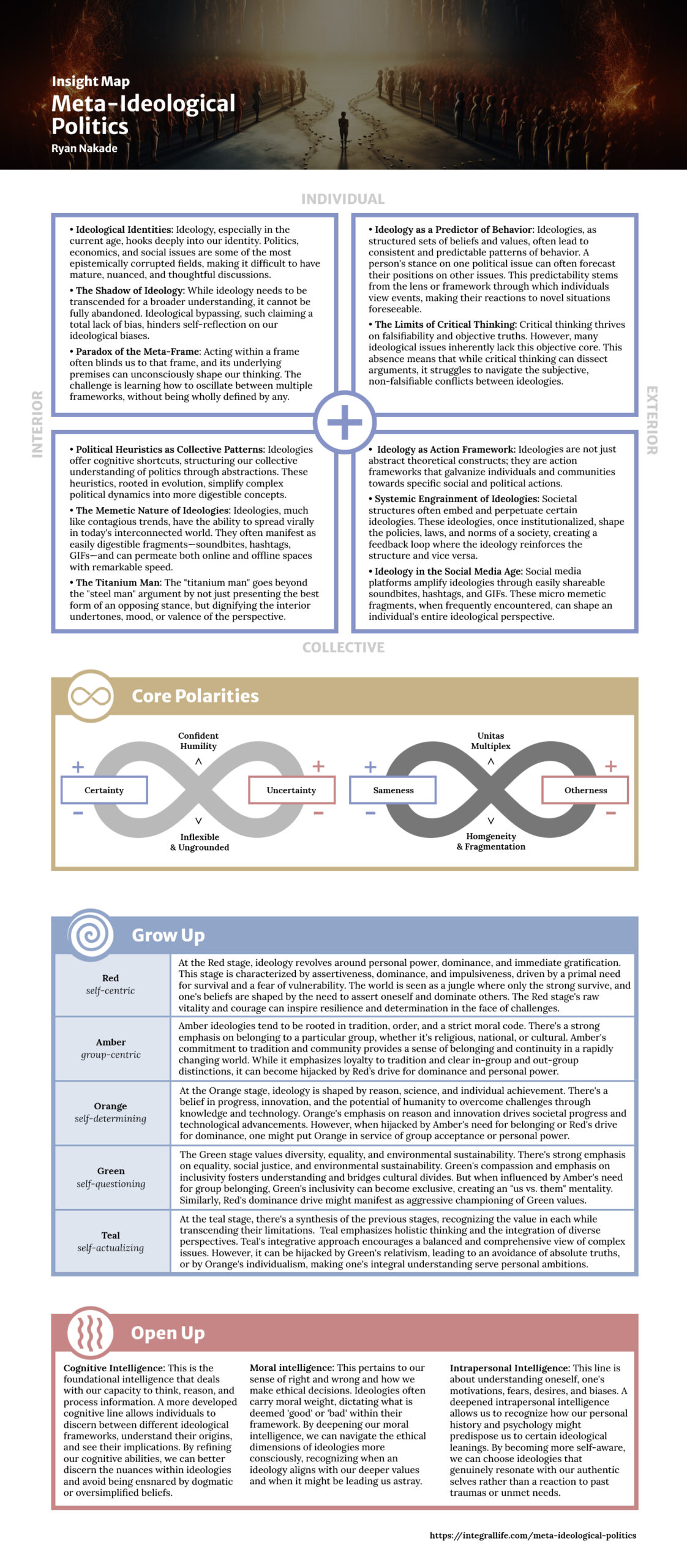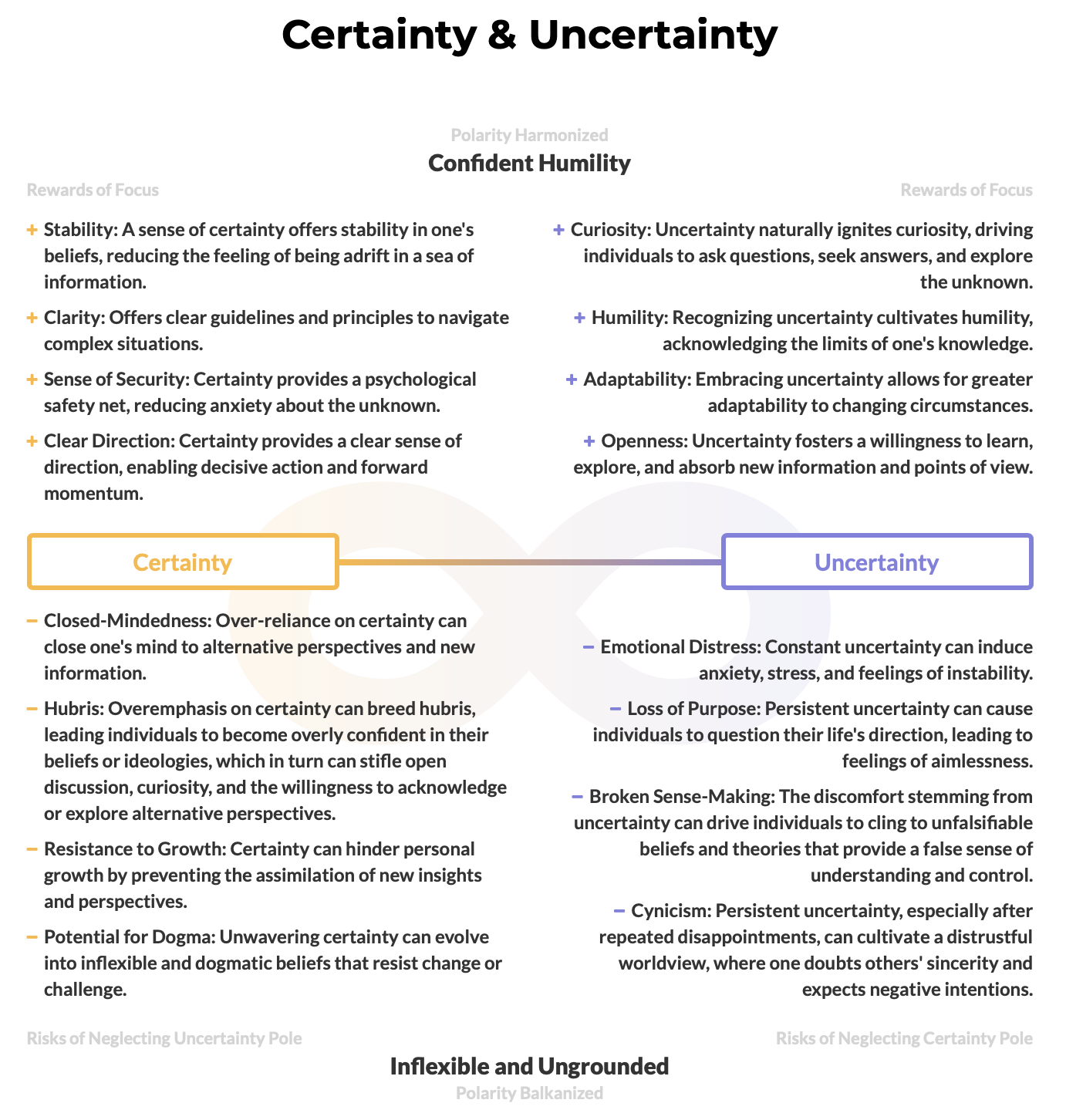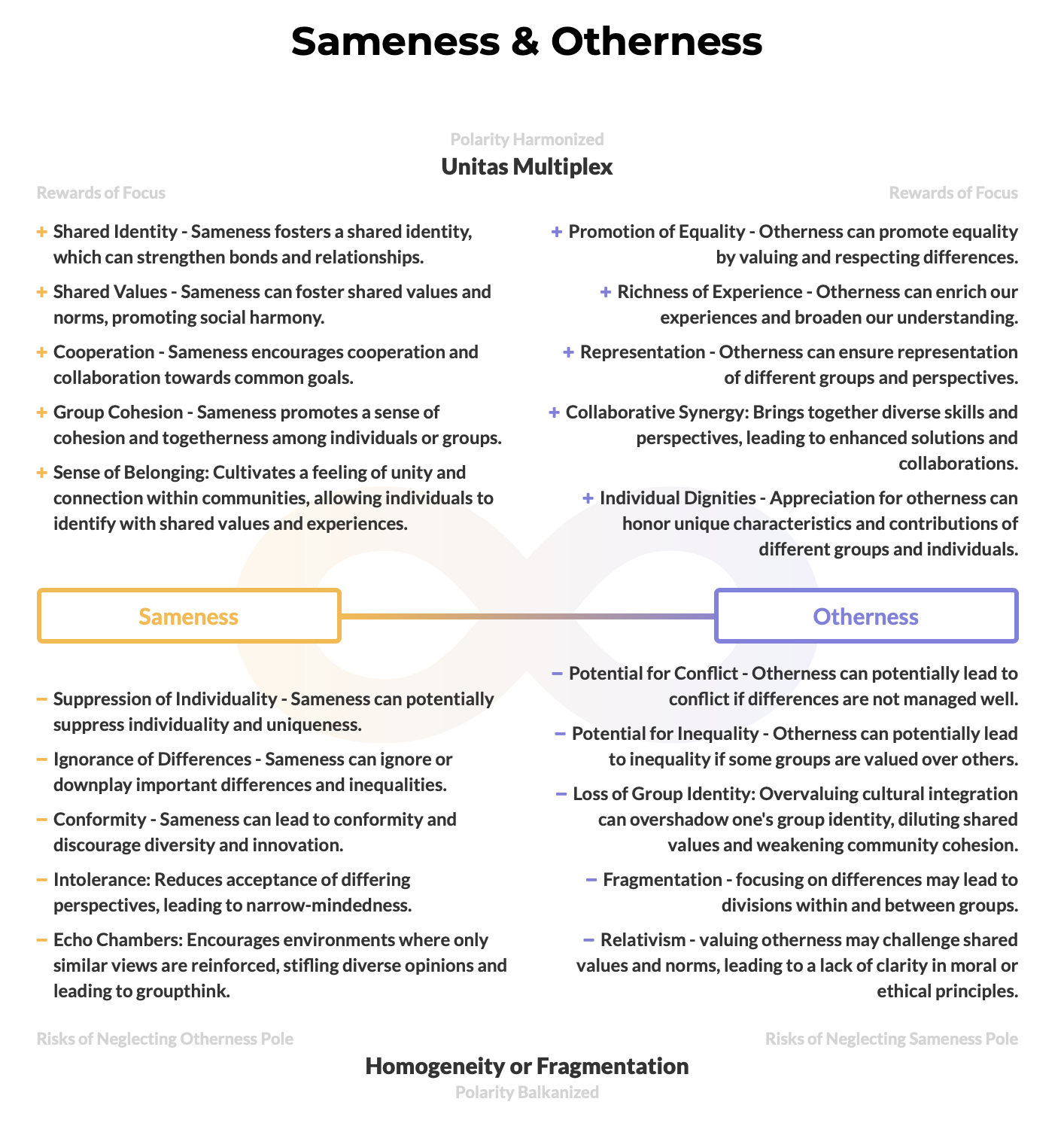Become a supporting member to watch the full conversation
Humanity is entering the Transformation Age, a new era of human civilization, with Integral Consciousness rising at its leading edge. Our members don’t use Integral Life as just another media subscription they use weekly or discard. Instead, most stay with us for years, using Integral Life to learn Integral Philosophy and build an integral mind slowly, methodically and when they need it. We’re here to help you shape the future that’s emerging no matter where your life takes you.
Get Full Access For $1 (7 days)*
Or explore all membership plans →
* Trial price for the first 7 days, then $20/month. Cancel or switch plans in 2 minutes at any time.
In a time when information is more abundant than ever, society faces the unintended repercussions of ideological rigidity, tribalism, and deep-rooted discord. The initial promise of social media to nurture connections and global understanding has, in many cases, led to the opposite effect. Rather than bridging gaps, these platforms often widen them, creating ideological echo chambers where individuals are only exposed to congruent views, thereby reinforcing and intensifying their existing beliefs. This tribal mindset not only hinders genuine dialogue but also exacerbates societal divisions, leading to a polarized world where anything like a “middle ground” seems harder to find than ever.
Ryan’s presentation delves into the complex nature of ideology and its profound impact on our perceptions, interactions, and behaviors. He underscores the human brain’s inherent tendency to seek patterns, elucidating how ideologies aid us in deciphering the world but can also misguide us. Ryan describes three definitions of “meta” to elucidate the concept of meta-ideological politics: “meta” as transcending, “meta” as between, and “meta” as self-aware or self-referential. He then defines ideology as “a constellation of foundational premises about politics and society, often which are contested by others, that form the basis for normative prescriptions.” Through interactive exercises and discussions, Ryan emphasized the necessity to transcend (and include) our entrenched beliefs, and to approach political and social issues with greater maturity, empathy, and nuance.
Ryan calls us to rise above the conflicts and limitations of conventional ideological frameworks. By recognizing the pitfalls of tribal thinking and the distortions of social media, there’s an opportunity to foster a more inclusive, more understanding, and more holistic worldview. Embracing this meta-ideological approach can help us extend our empathy and more fully inhabit each other’s point of view, while paving the way for more constructive dialogues and a more unified approach to addressing the pressing challenges of our time. Through the lens of meta-ideological politics, individuals and communities can navigate the complex ideological landscape with confident humility, avoiding the pitfalls of homogeneity and fragmentation, and fostering a culture of open dialogue and mutual respect.
Key Questions to Contemplate:
Self-Reflection on Ideology: How have my personal experiences, upbringing, and environment influenced my current ideological beliefs?
Ideological Flexibility: Am I able to step back from my own ideology and view it as just one of many possible perspectives? Can I see through it as well as look at it?
Emotional Undertones: How do my emotions and personal biases influence my adherence to certain ideologies? Am I reacting emotionally to opposing views?
Engaging with Opposing Views: How often do I engage with opposing ideologies in a genuine attempt to understand them? Do I “steel man” or “titanium man” opposing arguments to ensure I’m addressing their strongest form?
Ideological Evolution: How have my ideological beliefs evolved over time? What events or experiences prompted these shifts?
Construct Awareness: Am I aware of the constructs and frameworks that shape my understanding of the world? Can I differentiate between seeing through an ideology and looking at it?
Ideological Impact on Relationships: How do my ideological beliefs influence my interactions and relationships with others? Do they create barriers or bridges?
Ideological Simplification: Do I tend to oversimplify complex issues based on my ideological stance? How can I ensure I’m considering the full complexity of an issue?
Ideological Fear: What fears or concerns underpin my adherence to certain ideologies? How might these fears be influencing my beliefs and reactions?
Ideological Growth: What steps can I take to further refine and evolve my ideological understanding? How can I ensure I remain open to growth and change in this area?

Related Polarities
Here are some of the most critical polarities to consider while listening to this broadcast.
Certainty and Uncertainty form a core polarity that captures the tension between the human need for stability and the inherent unpredictability of life. While certainty offers a foundation, a sense of security, and clarity, uncertainty brings adaptability, openness, and the potential for growth. In the context of meta-ideological politics, this polarity becomes especially pronounced. The political landscape, with its myriad of ideologies and ever-evolving dynamics, challenges individuals to find a balance between holding firm convictions and remaining open to new perspectives.
Certainty represents the human desire for clarity, stability, and a sense of direction. It’s the anchor that allows individuals to navigate the complexities of life with confidence. In meta-ideological politics, certainty provides a foundation from which individuals can advocate for their beliefs, engage in meaningful discussions, and contribute to the political discourse with a clear sense of purpose and identity.
Uncertainty, in contrast, embodies the fluidity and unpredictability of life. It acknowledges the limitations of our knowledge and the ever-changing nature of the world around us. In the realm of meta-ideological politics, uncertainty promotes a willingness to adapt, to question one’s beliefs, and to remain open to the possibility that there might be other, equally valid, perspectives. It encourages political actors to approach discussions with humility, curiosity, and a genuine desire to understand and learn from others.
-

-
Integrated Polarity: Confident Humility
Confident Humility represents a balanced stance where individuals or groups can assert their beliefs with conviction while maintaining an openness to the unknown and a willingness to adapt. This mature stance allows one to stand firm in their understanding, yet remain humble in acknowledging the limitations of their knowledge and the ever-present potential for growth and learning. In the realm of meta-ideological politics, Confident Humility is pivotal for navigating the complex landscape of differing ideologies and political stances. It enables individuals and groups to confidently assert their ideological perspectives while remaining open to the insights and values embedded in alternative ideological frameworks. This balanced approach fosters constructive dialogue, mutual understanding, and the potential for integrative solutions that honor the wisdom within diverse ideological perspectives, thus facilitating a grounded yet adaptive engagement with complex and often contentious issues.
Disintegrated Polarity: Inflexibility and Ungroundedness
Inflexibility and Ungroundedness represent a disintegrated state where the poles of certainty and uncertainty are not harmoniously balanced, leading to a rigid or unanchored approach to understanding and engaging with complex issues. On one hand, inflexibility stems from an overemphasis on certainty, causing a rigid adherence to particular beliefs or ideologies without the willingness to adapt or consider alternative perspectives. This rigidity often manifests as dogmatism or an overconfidence in one’s own understanding, shutting down the possibility for growth, learning, or constructive dialogue. On the other hand, ungroundedness arises from an excessive leaning towards uncertainty, leading to a lack of firm beliefs or a coherent framework to make sense of the world. This can result in a form of aimlessness, where individuals or groups become susceptible to an overcomplexity of ideas without the ability to discern or commit to a particular course of action. In the realm of meta-ideological politics, the disintegrated polarity of Inflexibility and Ungroundedness hampers the ability to engage in meaningful discourse, explore integrative solutions, or navigate the complex ideological landscape with a sense of grounded understanding and adaptive flexibility.
Tips for integrating this polarity: To cultivate Confident Humility, engage in regular self-reflection and dialogue with diverse perspectives. Challenge yourself to voice your beliefs and understandings in discussions, but also actively seek feedback and alternative viewpoints. When confronted with differing opinions, rather than immediately defending your stance, take a moment to genuinely listen and consider the other perspective. This practice not only deepens your own understanding but also nurtures the capacity to hold your beliefs with both confidence and humility.
The polarity of Sameness and Otherness represents the tension between the universal and the particular, the familiar and the unfamiliar. It captures the human inclination to seek comfort in what is known and similar, while also being drawn to the allure of what is different and unique. This polarity is foundational to human experience, shaping our interactions, perceptions, and understanding of both self and the world.
Sameness represents the comfort of the familiar, the known, and the consistent. It’s the feeling of belonging, of being part of a group or community where shared values, beliefs, and experiences create a sense of unity. Sameness provides stability, predictability, and a sense of security. It’s the anchor that grounds us, offering a reference point from which we can navigate the complexities of life.
Otherness embodies the intrigue of the unfamiliar, the allure of difference, and the richness of diversity. It challenges our preconceptions, broadens our horizons, and introduces us to new perspectives and experiences. Otherness is the catalyst for growth, innovation, and change. It reminds us of the vastness of human experience and the infinite possibilities that lie beyond our immediate understanding.
-

-
Integrated Polarity: Unitas Multiplex
Unitas Multiplex, or “Unity in Diversity,” represents the harmonious integration of Sameness and Otherness. It acknowledges the foundational commonalities that bind us together while also valuing the diverse experiences and perspectives that enrich our collective understanding. By embracing Unitas Multiplex, individuals and communities can foster a sense of shared identity and purpose while also celebrating the unique contributions of each member. This balance ensures that while we recognize and appreciate our differences, we never lose sight of the shared values, goals, and experiences that unite us.
Disintegrated Polarity: Homogeneity & Fragmentation
Homogeneity & Fragmentation, as a disintegrated polarity of Sameness and Otherness, stifles constructive engagement with diverse ideologies. Homogeneity, stemming from an overemphasis on sameness, promotes uniformity and shuns differing viewpoints, hindering diversity and innovation. Conversely, Fragmentation, arising from an overemphasis on otherness, accentuates differences to a divisive extent, leading to a lack of cohesion and polarized interactions. In meta-ideological politics, this disintegrated polarity obstructs inclusive dialogue and the pursuit of integrative solutions that honor both shared and unique ideological perspectives.
Tips for integrating this polarity: To integrate the polarity of Sameness and Otherness, one can practice active listening and empathy. Engage with diverse communities, seek out different perspectives, and challenge your own beliefs. At the same time, find common ground, celebrate shared experiences, and build bridges of understanding. By consciously embracing both the familiar and the unfamiliar, we can create a more inclusive, enriched, and harmonious world.
Ryan grew up in a Buddhist temple in Hawaii, and was introduced to the works of Wilber at the age of 15. Ryan’s dream is to start the worlds first Integral political party, and eventually launch an Integrally informed campaign for president. He now lives in Gresham, OR, with his girlfriend and 2 goats, and is currently receiving training with the Department of Human Services in mediation, facilitation, and conflict coaching.




